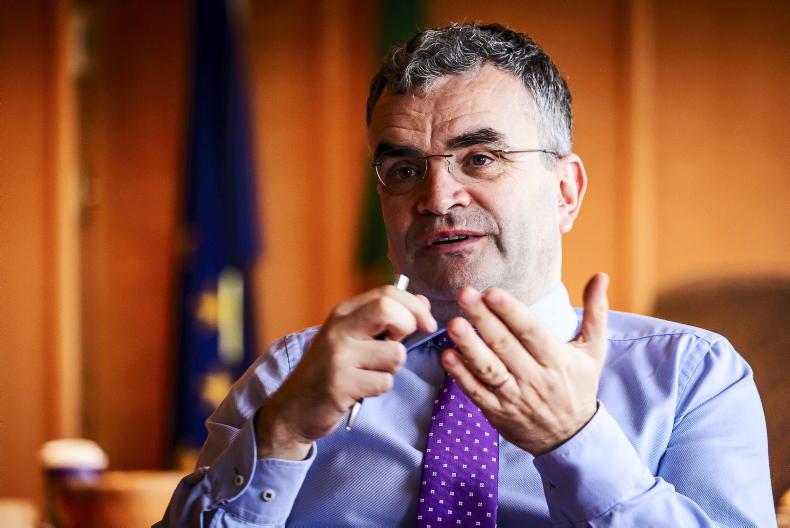Pharmacies are not the purely medicine-focused ‘chemist shops’ they once were. Now brightly lit with private consultation rooms, fancy waiting areas, phone chargers and even coffee machines, most also flog gifts of all sorts from handbags to hairdryers.
There are currently 1,910 pharmacies in Ireland, employing 14,325 people. Their main role is, of course, dispensing medicine and providing advice to patients but pharmacists are now very eager to expand their professional role, says Clare Fitzell, Head of Strategic Policy at the Irish Pharmacists Union (IPU).

Clare Fitzell, Head of Strategic Policy at the Irish Pharmacy Union.
So what changes have happened in the past five years, where exactly do pharmacists want to go from here, clinically speaking, and what difference will it make to us, the patients?
The biggest changes that she has seen over recent years include pharmacists providing the COVID-19 vaccination service and operating the free contraceptive service that began in September 2022.
“Outside of that would be the increase in the volume of prescription items and the consequent increase in queries about medicines. That’s because of our ageing population and the overall increase in medications prescribed,” she says.
Other changes have happened too, more recently.
Ownership structure has altered
While the number of pharmacies remains static, she says, the ownership structure has changed in the past five years. There are now less pharmacies owned by individual pharmacists.
“Both vertical and lateral integration is happening. Vertical is where wholesaling businesses are buying pharmacies and lateral is where small chains are coming together or buying each other out.
The biggest takeovers have been McCauleys, which was bought by the distributor Uniphar, and McCabes, which was bought by the Phoenix group, a wholesaler who also owns the Lloyds chain.”
Pharmacies no longer open up close to GP surgeries.

Minister for Health Stephen Donnelly TD receiving his flu jab at a community pharmacy.
The advent of Healthmail, the email system that allows communication between GPs, hospitals and pharmacies, has meant that having pharmacies situated close to GP surgeries isn’t as important anymore.
“Hard copy prescriptions are now no longer the norm. Where patients often got their prescription filled at the nearest pharmacy to their GP surgery in the past, now the electronic prescription is emailed to the patient’s pharmacy of choice.”
Fewer UK graduates
45% of new pharmacy graduates registered in Ireland used to come from UK pharmacy schools but not anymore. This may be because less Irish students are going over to UK universities to train or that the pharmacy job in the UK has been significantly transformed over years and people are staying on, she states.
“Independent prescribing is allowed there, as well as different roles around medicine optimisation (encouraging best use of medications) making the job more rewarding too.”
Pharmacists now have the autonomy to swap one generic medication for another, if a particular medication is unavailable, as long as the substitute is on the Health Products Regulatory Authority (HPRA) interchangeable list.
Renewal of prescriptions from 1 March 2024
This most recent legislative change, recommended by the Expert Task Force set up by the Minister for Health last July to support the expansion of the role of pharmacists in Ireland, will kick in on 1 March 2024.
This will allow pharmacists to decide to extend a prescription from six months to one year if the patient’s condition is stable.
The future
Pharmacists are keen to:
• Prescribe for common clinical conditions, e.g. be able to prescribe a steroid cream for a patient with eczema, thereby reducing GP visits.
• Have a medicine substitution protocol in place (currently being discussed) so that if there is a shortage of a particular drug pharmacists can offer an agreed substitute.
• Use robotic dispensing systems to speed up dispensing, and manage stock.
• Supply oral contraceptives to women without the need of a GP prescription and provide childhood vaccinations.
Current challenges for pharmacies
Fees and stress around administering community drug schemes come up pretty quickly when challenges for pharmacists are mentioned.
“The biggest issue is the lack of increase in pay for the last 16 years and equally, the complexity of the community drug scheme,” says Clare.
“About 70% of the prescriptions we dispense belong to the community drug schemes and we have been paid the same by the State for those for the last 16 years.
This is a significant strain given that every other cost is rising, insurance and wages, etc. We are requesting €6.50 per prescription rather than a sliding scale each month that goes from €5 down to €3.50.
(At present pharmacists get €5 for the first 1,667 items they dispense each month, €4.50 for the next 833 items and €3.50 for any remaining items they dispense that month).
The administrative work related to the Primary Care Reimbursement Scheme (PCRS) can be taxing, she says.
“It’s why staff retention is a problem. Some pharmacists are choosing to work in the pharmaceutical industry because they feel they didn’t train to be admin assistants.”
Some figures
A Review of the Community Pharmacy Sector in Ireland 2023 shows that:
Community drugs scheme revenues account for 57% of the turnover for the average pharmacy. However, over the past 15 years, core income from community drug schemes decreased by 29% while costs associated with dispensing medicines on behalf of the state increased by 23%, the IPU says. More than 10% of pharmacies are now loss making and is more heavily concentrated in rural areas. The Pharmacy Index 2023 researched by Behaviour and Attitudes on behalf of the Irish Pharmacy Union found that:
Over 90% of those surveyed were in favour of pharmacists being able to prescribe treatments for minor ailments such as back pain, migraine and indigestion.How increased pharmacy services help the patient
At present, better services benefit the public for the following reasons:
Makes services more accessible – important for time sensitive services such as Emergency Hormonal Contraceptive Services. Offers choice to patients to access service at times that suit them e.g. late evenings/weekends. Offers better value for money on medications because pharmacists can offer cheaper generic equivalents.In the future
Supply challenges will be less of a concern when pharmacists are allowed to therapeutically substitute when a patient’s normal
GP visit costs won’t be necessary for minor ailments and patients will have quicker access to care. One reader's experience
Maura Canning, from Galway, has high praise for her local pharmacy, Weaver’s in Loughrea. I get unreal service, I’m in a couple of times every week for one thing or another and I wouldn’t go anywhere else.
Both my parents have been very sick so I’d be talking to the pharmacists about their medication a lot. My father had a heart attack and had five stents put in so there’d be a lot of medication to check on. Pharmacists now are good at educating you about the medication but I’d always ask questions. I’d like to see pharmacists doing more, like prescribing for minor ailments so that you wouldn’t have to be looking for an appointment with a GP when it can take two weeks to get one. It’s crazy at the moment. Having pharmacists doing more would take pressure off.”
ICGP stance
We asked the GPs’ union if pharmacists prescribing more was something that they were in favour of, given that it could reduce GP income. In response, the medical firector of the Irish College of General Practitioners, Dr Diarmuid Quinlan, told Irish Country Living:
“The Irish College of General Practitioners is a member of the Expert Task Force, and supported the (recent) recommendation on prescription renewals.
GPs work closely with their local pharmacists in the care of their patients. Any proposals for further expansion of pharmacists’ roles will be discussed in the Task Force. The greater use of IT, in particular e-prescriptions, has been beneficial for patients, GPs and pharmacists alike.”
‘Behind the scenes there's a lot of work going on’
Global shortages of medicines have added to pharmacists’ stress and workload in the past two years, also.
“This is because we’ve seen a globalisation of Active Pharmaceutical Ingredients (API) manufacturers. Where in the past the ingredients might have been made by six or seven companies in several different countries they now tend to be made by one or two companies in one or two countries (mostly China and India).
If there is a war then or some other disruption like COVID-19 or problems at a particular plant this will have supply implications globally.”
The good news is that the EU is looking at legislative reform to bring some of the API manufacture into Europe so that we are not so reliant on China and India, she adds.
“Behind the scenes there is a lot of work going on also, related to critical medicines (those that have no equivalent). This is to see how the system can be made more resilient to prevent any shortages of those medicines.”
Shortages can also occur, of course, because of high demand e.g. the recent shortage of HRT medication and the diabetes medication, Ozempic.
Read more
Asbestos: ‘for farmers, the risk is in old machinery and older buildings
Getting vocal about shopping local
Pharmacies are not the purely medicine-focused ‘chemist shops’ they once were. Now brightly lit with private consultation rooms, fancy waiting areas, phone chargers and even coffee machines, most also flog gifts of all sorts from handbags to hairdryers.
There are currently 1,910 pharmacies in Ireland, employing 14,325 people. Their main role is, of course, dispensing medicine and providing advice to patients but pharmacists are now very eager to expand their professional role, says Clare Fitzell, Head of Strategic Policy at the Irish Pharmacists Union (IPU).

Clare Fitzell, Head of Strategic Policy at the Irish Pharmacy Union.
So what changes have happened in the past five years, where exactly do pharmacists want to go from here, clinically speaking, and what difference will it make to us, the patients?
The biggest changes that she has seen over recent years include pharmacists providing the COVID-19 vaccination service and operating the free contraceptive service that began in September 2022.
“Outside of that would be the increase in the volume of prescription items and the consequent increase in queries about medicines. That’s because of our ageing population and the overall increase in medications prescribed,” she says.
Other changes have happened too, more recently.
Ownership structure has altered
While the number of pharmacies remains static, she says, the ownership structure has changed in the past five years. There are now less pharmacies owned by individual pharmacists.
“Both vertical and lateral integration is happening. Vertical is where wholesaling businesses are buying pharmacies and lateral is where small chains are coming together or buying each other out.
The biggest takeovers have been McCauleys, which was bought by the distributor Uniphar, and McCabes, which was bought by the Phoenix group, a wholesaler who also owns the Lloyds chain.”
Pharmacies no longer open up close to GP surgeries.

Minister for Health Stephen Donnelly TD receiving his flu jab at a community pharmacy.
The advent of Healthmail, the email system that allows communication between GPs, hospitals and pharmacies, has meant that having pharmacies situated close to GP surgeries isn’t as important anymore.
“Hard copy prescriptions are now no longer the norm. Where patients often got their prescription filled at the nearest pharmacy to their GP surgery in the past, now the electronic prescription is emailed to the patient’s pharmacy of choice.”
Fewer UK graduates
45% of new pharmacy graduates registered in Ireland used to come from UK pharmacy schools but not anymore. This may be because less Irish students are going over to UK universities to train or that the pharmacy job in the UK has been significantly transformed over years and people are staying on, she states.
“Independent prescribing is allowed there, as well as different roles around medicine optimisation (encouraging best use of medications) making the job more rewarding too.”
Pharmacists now have the autonomy to swap one generic medication for another, if a particular medication is unavailable, as long as the substitute is on the Health Products Regulatory Authority (HPRA) interchangeable list.
Renewal of prescriptions from 1 March 2024
This most recent legislative change, recommended by the Expert Task Force set up by the Minister for Health last July to support the expansion of the role of pharmacists in Ireland, will kick in on 1 March 2024.
This will allow pharmacists to decide to extend a prescription from six months to one year if the patient’s condition is stable.
The future
Pharmacists are keen to:
• Prescribe for common clinical conditions, e.g. be able to prescribe a steroid cream for a patient with eczema, thereby reducing GP visits.
• Have a medicine substitution protocol in place (currently being discussed) so that if there is a shortage of a particular drug pharmacists can offer an agreed substitute.
• Use robotic dispensing systems to speed up dispensing, and manage stock.
• Supply oral contraceptives to women without the need of a GP prescription and provide childhood vaccinations.
Current challenges for pharmacies
Fees and stress around administering community drug schemes come up pretty quickly when challenges for pharmacists are mentioned.
“The biggest issue is the lack of increase in pay for the last 16 years and equally, the complexity of the community drug scheme,” says Clare.
“About 70% of the prescriptions we dispense belong to the community drug schemes and we have been paid the same by the State for those for the last 16 years.
This is a significant strain given that every other cost is rising, insurance and wages, etc. We are requesting €6.50 per prescription rather than a sliding scale each month that goes from €5 down to €3.50.
(At present pharmacists get €5 for the first 1,667 items they dispense each month, €4.50 for the next 833 items and €3.50 for any remaining items they dispense that month).
The administrative work related to the Primary Care Reimbursement Scheme (PCRS) can be taxing, she says.
“It’s why staff retention is a problem. Some pharmacists are choosing to work in the pharmaceutical industry because they feel they didn’t train to be admin assistants.”
Some figures
A Review of the Community Pharmacy Sector in Ireland 2023 shows that:
Community drugs scheme revenues account for 57% of the turnover for the average pharmacy. However, over the past 15 years, core income from community drug schemes decreased by 29% while costs associated with dispensing medicines on behalf of the state increased by 23%, the IPU says. More than 10% of pharmacies are now loss making and is more heavily concentrated in rural areas. The Pharmacy Index 2023 researched by Behaviour and Attitudes on behalf of the Irish Pharmacy Union found that:
Over 90% of those surveyed were in favour of pharmacists being able to prescribe treatments for minor ailments such as back pain, migraine and indigestion.How increased pharmacy services help the patient
At present, better services benefit the public for the following reasons:
Makes services more accessible – important for time sensitive services such as Emergency Hormonal Contraceptive Services. Offers choice to patients to access service at times that suit them e.g. late evenings/weekends. Offers better value for money on medications because pharmacists can offer cheaper generic equivalents.In the future
Supply challenges will be less of a concern when pharmacists are allowed to therapeutically substitute when a patient’s normal
GP visit costs won’t be necessary for minor ailments and patients will have quicker access to care. One reader's experience
Maura Canning, from Galway, has high praise for her local pharmacy, Weaver’s in Loughrea. I get unreal service, I’m in a couple of times every week for one thing or another and I wouldn’t go anywhere else.
Both my parents have been very sick so I’d be talking to the pharmacists about their medication a lot. My father had a heart attack and had five stents put in so there’d be a lot of medication to check on. Pharmacists now are good at educating you about the medication but I’d always ask questions. I’d like to see pharmacists doing more, like prescribing for minor ailments so that you wouldn’t have to be looking for an appointment with a GP when it can take two weeks to get one. It’s crazy at the moment. Having pharmacists doing more would take pressure off.”
ICGP stance
We asked the GPs’ union if pharmacists prescribing more was something that they were in favour of, given that it could reduce GP income. In response, the medical firector of the Irish College of General Practitioners, Dr Diarmuid Quinlan, told Irish Country Living:
“The Irish College of General Practitioners is a member of the Expert Task Force, and supported the (recent) recommendation on prescription renewals.
GPs work closely with their local pharmacists in the care of their patients. Any proposals for further expansion of pharmacists’ roles will be discussed in the Task Force. The greater use of IT, in particular e-prescriptions, has been beneficial for patients, GPs and pharmacists alike.”
‘Behind the scenes there's a lot of work going on’
Global shortages of medicines have added to pharmacists’ stress and workload in the past two years, also.
“This is because we’ve seen a globalisation of Active Pharmaceutical Ingredients (API) manufacturers. Where in the past the ingredients might have been made by six or seven companies in several different countries they now tend to be made by one or two companies in one or two countries (mostly China and India).
If there is a war then or some other disruption like COVID-19 or problems at a particular plant this will have supply implications globally.”
The good news is that the EU is looking at legislative reform to bring some of the API manufacture into Europe so that we are not so reliant on China and India, she adds.
“Behind the scenes there is a lot of work going on also, related to critical medicines (those that have no equivalent). This is to see how the system can be made more resilient to prevent any shortages of those medicines.”
Shortages can also occur, of course, because of high demand e.g. the recent shortage of HRT medication and the diabetes medication, Ozempic.
Read more
Asbestos: ‘for farmers, the risk is in old machinery and older buildings
Getting vocal about shopping local











SHARING OPTIONS